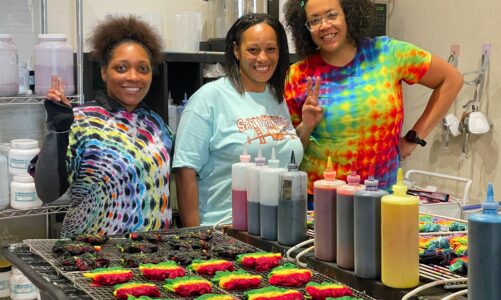[Photo by Linda Kelly]
When you focus on supporting locally, it makes a difference.
For more than three decades the Coalition on Homelessness team has been endeavoring to practice community organizing and running the independent newspaper Street Sheets. Written by people with lived experience of homelessness and distributed by people experiencing homelessness, those who offer it for a donation around the Bay area get to keep the proceeds. In that way the project supports itself and is able to be a voice for marginalized individuals. This past month I had the opportunity to catch up with them and get a tour of the historic Haight Ashbury District from Flower Power Walking Tours with Haight street local, Stannous Fluoride.
Historically the Haight has been a cultural crossroads due to the open mindedness and kindness perpetuated by the Black community that lived there after the announcement of plans for a panhandle highway construction project (the embarcadero portion collapsed in the 89’ loma prieta earthquake) inspired people to move and created lower rents in the the Haight. After the North Beach portion of the highway was completed that neighborhood became too expensive for the beat poets and other creatives to stay and they found themselves on Haight street
On my walking tour with Stannus, the creator of the original Haight Ashbury Star Map, I learned from his research and lived experience how groups like The Diggers, Haight Ashbury Free Clinic, and the Haight Ashbury Food Program took action to make positive changes in the Haight Street community.
In a modern era, The Haight Ashbury Free Clinic and the Haight Ashbury Food Program are still keeping people healthy and fed. The Free Clinic opened in 1967 as the first nonsectarian free medical clinic in the United States. Over 400 patients were seen in its first week of operation, demonstrating the need for health care services as a human right, regardless of income level. The Haight Ashbury Food Program was founded in 1983 as a neighborhood response to hunger. They exist to provide food and referral services to those in need, while fostering a sense of belonging and self worth for all involved. They operate a food pantry every Saturday morning to this day.
The Coalition on Homelessness publishes and distributes Street Sheets to help us stay connected to our communities. Street Sheets Newspaper created a basis of support for the organization to keep it independent and therefore able to be a strong advocate for the voices of people who are unhoused. Being an independent press means they can stand up for what they believe in and focus on problem solving instead of doing what is popular or easy.
Jennifer Friedenbach, the Executive Director of The Coalition on Homelessness said a lot of things I loved at their event but the idea that “We can address these problems with people power” was one I found both inspiring and actionable. People power, she says, “is speaking up for what you believe in and using your time to support your local community. Looking and learning about the problems around you and making a difference for your neighbors. The power of telling their own stories and being empowered to support themselves.” In my opinion one of the most beautiful things about San Francisco is that it is full of people power. Everywhere when I walk around I do see struggle and difficulty but in the words of Mr. Rogers I also see all the helpers, all the human beings who are doing their best to make things better even if we don’t all agree about how. As I have reflected on the practice of looking for the helpers when things are really hard, the second part that Mr. Rogers didn’t say, if you don’t see any helpers, learning how you can become one will also help you feel better about how hard things can be.
I asked Jennifer: “What can your average community member do to be a better neighbor to those experiencing homelessness?” and she said “All San Franciscans can be allies to the community. Treat your unhoused neighbors like your housed neighbors, acknowledge them, smile at them, ask how they are doing. Join your neighborhood groups…No citation has ever gotten someone off the streets. Advocate at city hall and get resources for your community to get people off the street. If there aren’t resources in your community, work with your neighbors to get them.”
You can help your community by contributing to or volunteering with a local food pantry or by taking the time to get to know your neighbors, both housed and unhoused. If you live here in the Haight, you can get involved with the Haight Ashbury Neighborhood Council (“HANC”), or (if you run a local business) join the Haight Ashbury Merchants Association (“HAMA”) today!
One thing I know for sure is that it’s never a bad time to start doing the right thing.
Links and References
Other cool places to find the powerful printed word:
Bound Together Books Collective
Resources to support people experiencing homeless and connect with local community
How To Be a Housed Ally
https://www.cohsf.org/wp-content/uploads/2021/01/How-to-Be-a-Housed-Ally-to-PEH-1.pdf
HAMA https://www.shophaight.com/
The Alembic https://alembicsf.com/
Flower Power Walking Tours https://www.haightashburytour.com/
Haight Ashbury Free Clinic https://www.healthright360.org/parent-program/haight-ashbury-medical-clinics/
Haight Ashbury Food Program https://www.thefoodprogram.org/
Housing Resource Info
https://www.streetsteam.org/about-homelessness
https://sfserviceguide.org/services/2562
https://www.sfchronicle.com/opinion/editorials/article/san-francisco-homeless-emergency-17744589.php
References
ACT UP https://actupny.com/
Food Not Bombs https://foodnotbombs.net/new_site/
Mr. Rogers ‘look for the helpers’ https://www.youtube.com/watch?v=-LGHtc_D328
Freeway Project https://www.sfchronicle.com/vault/article/panhandle-freeway-san-francisco-citizen-revolt-18331030.php
https://www.sfchronicle.com/oursf/article/1958-photos-of-the-Embarcadero-Freeway-A-13970285.php




